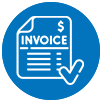Business Loan
- Home
- Business Loan
Business Loans: Fuel Your Enterprise Growth
Types of Business Loans

Term Loans

Working Capital Loans

Equipment Financing

Invoice Financing

Business Line of Credit

SBA Loans

Merchant Cash Advances
Business Loan Fees and Charges
Business loan lenders usually charge processing fees, prepayment charges, commitment charges, inspection charges, account service charges, penal interest and documentation charges from their business loan borrowers.
However, the fees and charges levied on business loans vary widely across lenders. Below-mentioned is an overall range of a few charges levied by the lenders on business loans.
| Particulars | Charges |
| Processing Fees | Up to 6% of the loan amount |
| Prepayment Charges | Up to 5% of the outstanding principal |
| Penal Interest | 2%-6% on the outstanding loan amount |
0 INR
0 INR
0 INR
Benefits of Business Loans
Capital for Growth: Business loans provide the necessary funds to invest in expansion, new projects, or additional inventory.
Cash Flow Management: Maintain smooth operations by covering payroll, rent, and other recurring expenses.
Build Credit History: Successfully repaying business loans can improve your business credit score, making it easier to obtain future financing.
Ownership Retention: Unlike equity financing, business loans do not require you to give up ownership stakes in your company.
Tax Benefits: Interest paid on business loans is often tax-deductible, reducing the overall cost of borrowing.
Business Loan offered by Top Lenders
| Interest Rate | 10% p.a. onwards |
| Loan Amount | Up to Rs 3 crore |
| Tenure | Up to 7 years |
| Processing Fee | Up to 2% of loan amount |
ICICI Bank Business Loan
| Interest Rate | Up to 17% p.a. |
| Loan Amount | Up to Rs 10 crore |
| Tenure | Up to 7 years |
| Processing Fee | Up to 2% of loan amount |
Axis Bank Business Loan
| Interest Rate | 10.75% p.a. onwards |
| Loan Amount | Up to Rs 10 crore |
| Tenure | Up to 15 years |
| Processing Fee | Up to 2% of loan amount |
Bajaj Finance Limited Business Loan
| Interest Rate | 9.75% to 30% p.a. |
| Loan Amount | Up to Rs 80 lakh |
| Tenure | Up to 12 years |
| Processing Fee | Up to 2.95% |
How to Apply for a Business Loan
Determine Your Needs: Assess how much capital you need and the purpose of the loan.
Check Eligibility: Review the lender’s eligibility criteria, including credit score requirements, business history, and financial statements.
Prepare Documentation: Gather necessary documents such as tax returns, bank statements, business plans, and financial projections.
Compare Lenders: Research different lenders and their loan products, interest rates, terms, and fees.
Submit Application: Complete the loan application form, providing accurate and detailed information.
Await Approval: Lenders will evaluate your application, creditworthiness, and business viability before approving the loan.
Receive Funds: Upon approval, the loan amount will be disbursed, and you can start using the funds as planned.
Business Loan FAQ
Common types of business loans include:
- Term Loans: Fixed amounts repaid over a specified period.
- Working Capital Loans: For day-to-day operational expenses.
- Equipment Financing: To purchase or lease equipment.
- Invoice Financing: Advances on unpaid invoices.
- Business Line of Credit: Flexible, revolving credit with a set limit.
- SBA Loans: Government-backed loans with favorable terms.
- Merchant Cash Advances: Based on future credit card sales.
- Credit Score: Good personal and business credit scores.
- Business Plan: Detailed plan showing how the loan will be used.
- Financial Statements: Profit and loss statements, balance sheets, and cash flow statements.
- Business History: Generally, at least one to two years of operational history.
- Collateral: For secured loans, assets to pledge as security.
- Business Plan: Outline of business goals and how funds will be used.
- Financial Statements: Recent balance sheets, profit and loss statements, and cash flow statements.
- Tax Returns: Business and personal tax returns for the past few years.
- Bank Statements: Recent statements showing cash flow.
- Legal Documents: Business licenses, registrations, and articles of incorporation.
Common documents include:
- Capital Access: Provides the necessary funds to grow and sustain your business.
- Cash Flow Management: Helps manage operational expenses and maintain liquidity.
- Build Credit: Timely repayments can improve your business credit score.
- Tax Benefits: Interest paid on business loans is often tax-deductible.
Consider the following factors:
- Loan Amount: Ensure the loan amount meets your needs.
- Interest Rates: Compare rates to find the most affordable option.
- Repayment Terms: Choose terms that align with your cash flow.
- Lender Reputation: Research lenders for reliability and customer service.
- Loan Type: Select a loan that matches your specific purpose, whether it’s for equipment, working capital, or expansion.
